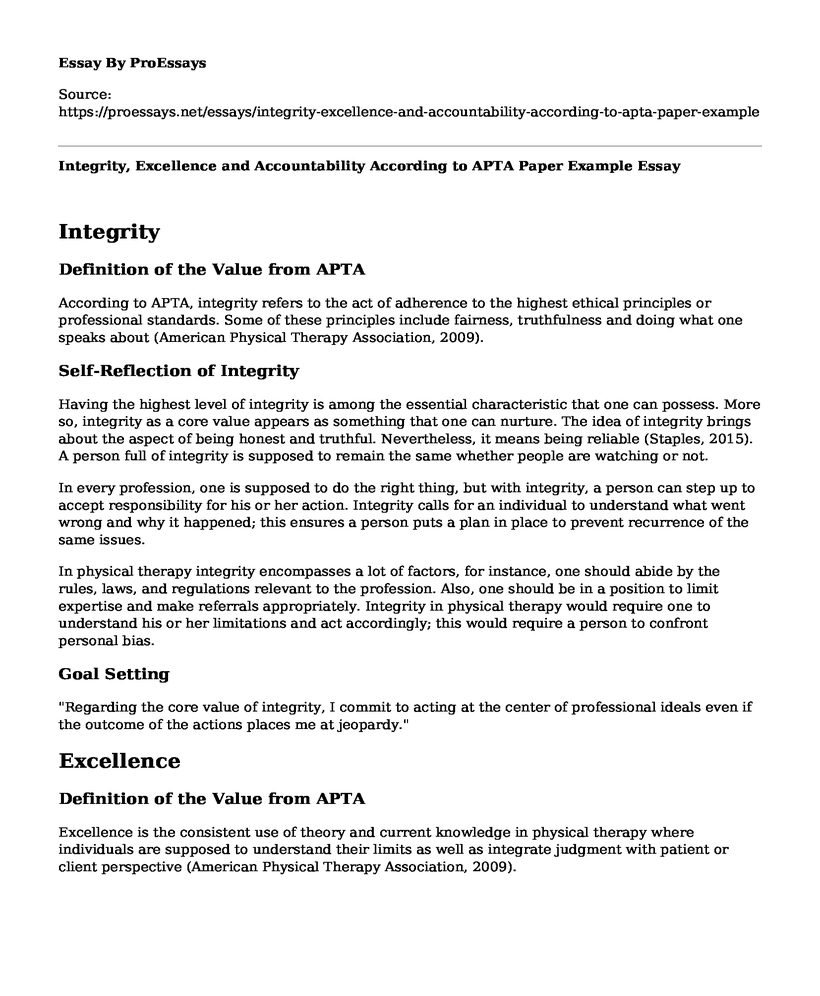Integrity
Definition of the Value from APTA
According to APTA, integrity refers to the act of adherence to the highest ethical principles or professional standards. Some of these principles include fairness, truthfulness and doing what one speaks about (American Physical Therapy Association, 2009).
Self-Reflection of Integrity
Having the highest level of integrity is among the essential characteristic that one can possess. More so, integrity as a core value appears as something that one can nurture. The idea of integrity brings about the aspect of being honest and truthful. Nevertheless, it means being reliable (Staples, 2015). A person full of integrity is supposed to remain the same whether people are watching or not.
In every profession, one is supposed to do the right thing, but with integrity, a person can step up to accept responsibility for his or her action. Integrity calls for an individual to understand what went wrong and why it happened; this ensures a person puts a plan in place to prevent recurrence of the same issues.
In physical therapy integrity encompasses a lot of factors, for instance, one should abide by the rules, laws, and regulations relevant to the profession. Also, one should be in a position to limit expertise and make referrals appropriately. Integrity in physical therapy would require one to understand his or her limitations and act accordingly; this would require a person to confront personal bias.
Goal Setting
"Regarding the core value of integrity, I commit to acting at the center of professional ideals even if the outcome of the actions places me at jeopardy."
Excellence
Definition of the Value from APTA
Excellence is the consistent use of theory and current knowledge in physical therapy where individuals are supposed to understand their limits as well as integrate judgment with patient or client perspective (American Physical Therapy Association, 2009).
Self-Reflection of Excellence
Excellence requires an individual to challenge mediocrity as well as work towards the development of new knowledge. The definition of excellence according to APTA gives one a guideline on how to be right about an individual's skills, knowledge, and practice.
Excellence starts with a professional presence and demeanor where one is supposed to be outstanding and never allow other things to be the source of distraction be it a bad wardrobe choice. Excellence dictates good appearance starting from the clothes to skills. One is supposed to have a sharp critical thinking and problem-solving skills in the daily practice. Additionally, one is supposed to take responsibility for choices and growth of skills.
One way of effectively challenging mediocrity in the physical therapy practice would be the possession of excellent interpersonal and communication skills; this would play an essential role in incorporating patient perspectives. Nonetheless, the ability to deal with stressors and the effective use of resources is what separates an excellent employee from a good one (Beatty, 2015). For an individual to reach a superior level, then one must learn to hear and incorporate feedback.
Some of the things that one would pursue to be excellent in physical therapy include demonstrating tolerance for ambiguity, using evidence now and then in support of professional decisions and using numerous bases of proof to backing professional practice and decisions.
Goal Setting
"Regarding the core value of excellence, I commit to participate in collaborative and integrative practice as a way of promoting high-quality health."
Accountability
Definition of the Value from APTA
Accountability is the taking of responsibility for one's roles, obligations, and actions; this involves self-behavior that positively impacts patient or client outcomes as well as the health needs of the society (American Physical Therapy Association, 2009).
Self-Reflection of Accountability
Being accountable means feeling bad if one promises to do something but fails. For instance, one may choose to build a positive relationship with a client but fail to keep the word. Accountability involves telling fellow physicians on a program that one is working on so that in case of anything one is held responsible.
Accountability means owning one's actions. Hence, in physical therapy one should conduct the therapy with confidence because one is sure of what he or she is doing; this increases confidence amongst clients because one is reliable. Accountability enables one to create a goal and communicate it to the outside world.
In physical therapy, maintaining one's membership in APTA means accountability. As an ambassador of accountability, one should seek continuous improvement in the quality of care. On the other hand, one should always communicate with patients or clients about professional actions. Additionally, one should adhere to policies, standards of practice and code of ethics that govern the conduct of professional activities. Also, an accountable physical therapist is a person who acknowledges and accepts the consequences of his or her actions.
Goal Setting
"Regarding the core value of accountability, I commit to play a part in the attainment of health goals of patients and society as well as assume the responsibility for learning and change."
References
American Physical Therapy Association. (2009). Professionalism in physical therapy: Core Values. American Physical Therapy Association, 1-6.
Beatty, D. (2015, March 15). Excellence: APTA core values reflection. Retrieved from Wordpress: https://rampages.us/beattyda2/2015/03/15/excellence-the-foundation-and-the-future/
Staples, S. (2015). Reflections on the value of integrity. Retrieved from Rockford Kingsley, Ltd: http://www.rockfordkingsley.org/EncouragementandSupport/YourLife,Unlimited/ReflectionsOnTheValueofIntegrity/tabid/173/Default.aspx
Cite this page
Integrity, Excellence and Accountability According to APTA Paper Example. (2022, Sep 07). Retrieved from https://proessays.net/essays/integrity-excellence-and-accountability-according-to-apta-paper-example
If you are the original author of this essay and no longer wish to have it published on the ProEssays website, please click below to request its removal:
- Research Paper on Health Communication and Public Health Campaigns
- What Are the Health Benefits Associated With the Consumption of Caffeine?
- Research Paper on Global Warming and its Impact on our Health
- Essay Sample on Primary Health Nursing: Knowledge & Skills
- Essay Example on Effexor: A Comprehensive Guide to Antidepressant Treatment
- Essay Sample: Safety Concerns for a New Forensic Nurse of a Trauma Patient
- Generalist Practice and Voting - Essay Example







